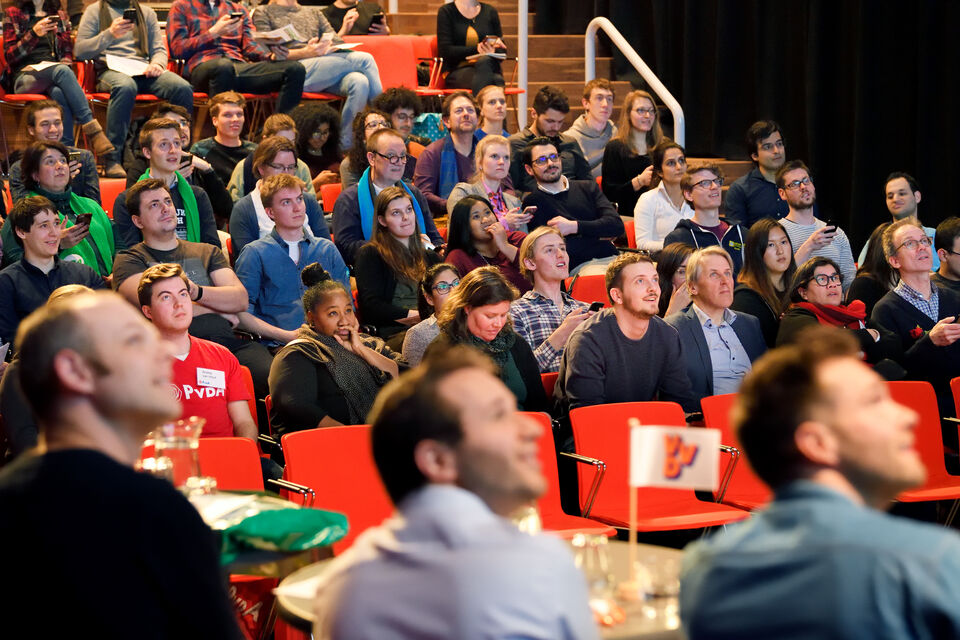Internationals ask politicians to combat discrimination
For ‘Eindhoven elections’, organized last Friday by Cosmos, youth party DWARS and Studium Generale, seven local councilors turned out to inform international students and employees about the forthcoming municipal elections. The audience chose the propositions but, above all, seemed keen to mention the discrimination experienced by internationals. At any rate, that topic was debated the most vociferously.
The substantial turnout in Luna's Corona Room reflects the need among internationals for information about the municipal elections. Valérie Tjin-A-Djie came to Eindhoven from Suriname in 2013 and, despite her Dutch nationality, is as she puts it ‘in the dark’. “I really hope I can find out here how I should vote.”
TU/e student Eva de Bruijn tells the audience, before the propositions are chosen, how Eindhoven's political system works. “There are 45 local councilors, representing at present eleven parties. We cannot elect our mayor. There are seven aldermen. On March 21st, we'll also be voting on the dragnet surveillance bill, but only Dutch citizens can participate in that vote.” In very practical terms she explains how the voting system works: “Don't throw your polling card away. And take some proof of identity along with you. You can use any of the polling stations until 21.00 hrs, including in De Zwarte Doos and MetaForum.” Lightheartedly, she explains that the votes will be counted manually. And, on a serious note, that the role of internationals doesn't end with voting: “You can get active and simply call up the politicians. Or go up and speak to them this evening.”
The organizers have come up with six propositions. Via an app the audience chooses to discuss the following themes: the growth of Eindhoven Airport, social housing, and road traffic in the city center.
(more text below picture)
That Eindhoven Airport should be allowed to expand is an opinion held only by Jeroen Dasbach (TU/e alumnus, VVD, the conservative-liberal party). Rik Thijs of GroenLinks (GreenLeft) is completely opposed to the idea. The rest, namely PvdA (center-left party), ChristenUnie (a socially conservative party), CDA (centre-right Christian democrats), Ouderen Appel (Eindhoven's seniors party) and SP (socialist party), are less clear about their standpoint. “Growth is okay, provided it is in consultation with local residents,” and “Brainport must be accessible, but we don't want any noise nuisance,” and “Step-by-step growth is an option". With a touch of originality, Caro Goudriaan of SP simply says, “Preferably trains.”
Abuses
As for new housing, only VVD's opinion differs from the consensus. The party doesn't want new social housing to have priority over new homes for people with higher incomes. Actually, the rest doesn't want that either: everyone argues for a mix of homes for every income group, as well as for student accommodation. And then the mood in the room becomes more lively. The audience seizes the chance to ask what the speakers can do about the abuses they often encounter.
“I was on the waiting list for fourteen months,” says a PhD candidate. “As a Dutch citizen I am paying much less at Vestide than my international friends for a similar room,” states Yoram Meijaard of Groep-één. “You really aren't going to get a room by going along to an open evening. And on Facebook it will say that a Dutch speaker is wanted,” says a young woman.
Mieke Verhees (PvdA) responds immediately, “That is unacceptable. Sue the landlord. No one at this table thinks that is okay.” The VVD is keen to update the rules about student homes in residential neighborhoods, and Jack Kerremans of Ouderen Appel adds that our standards and values could also do with a being refreshed. At any rate, this is something the municipal council needs to address on March 22, says Rik Thijs.
Information in English
From discrimination in the rental housing market the audience moves on to exclusion experienced at official authorities. “There are hardly any English-language websites. At DUO I didn't know whether I was getting money or had to pay,” an Indian man complains. The politicians pull the discussion back to the elections. “It really is scandalous that the polling card isn't explained in English,” someone says to general agreement. GroenLinks assures everyone that this topic will now be tackled in a campaign on social media.
For the third proposition, about less road traffic in the city, there's no time left. That's a shame, nonetheless chemistry student Limi Kalapurackal (born in India, but holding an Austrian passport) has learned a lot this evening. “I'd already filled in the – English-language – voting quiz and came here for more information. The outcome I got was I should vote for GroenLinks and this debate has confirmed that impression.” She has not yet received her polling card, “I've just moved home,” but she fully intends to chase it up and use it.



Discussion